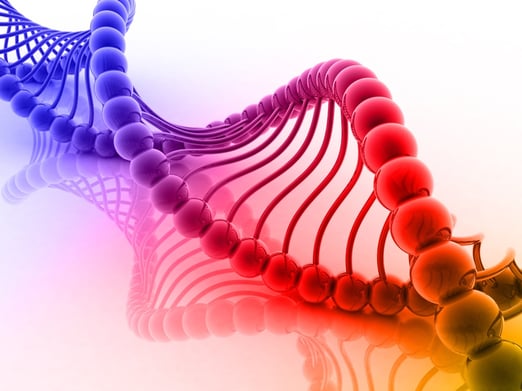What is the epigenome?
The epigenome is a mixture of chemical compounds and proteins that attach to DNA and tell the genome what to do. It turns genes on or off, controlling the production of proteins in a particular cell.1 These chemical compounds modify cell division, and may be inherited. Recent studies, however, show that environmental influences, such as diet and exposure to pollutants, can alter the epigenome.2 The epigenome is what makes each individual unique. It is what makes some of us have darker or lighter skin, controls the color and texture of our hair, and explains why some people are more introverted while others are extroverts.3

Two types of Epigenomic Compounds
Chemical compounds attach to the genome, “marking” it and altering the function of the DNA. There are two types of marks:
- DNA methylation – affects the DNA directly in the genome. Proteins attach chemical tags (methyl groups) to the bases of the DNA molecule in specific places. These methyl groups then turn genes on or off, affecting the interactions between the DNA and other proteins. This is how cells know which genes are turned on and which are off.
- Histone modification – affects the DNA indirectly. The DNA inside cells is wrapped around histone proteins. This is what enables the DNA’s long molecules to wind up into chromosomes inside the nucleus of the cell. Proteins can attach an excess of chemical tags to histone proteins, alerting other proteins in the cell to decide if that section of DNA should be used or ignored.4
Impinting
There are two copies of each gene, one inherited from the mother and one from the father. The epigenome determines which copy of the genes get turned on and which get turned off at any one time. This is known as imprinting. Since this pattern can be altered by the epigenome itself, there are some health conditions that may develop through abnormal imprinting. Examples include:
- Beckwith-Wiedemann Syndrome – a condition where some specific parts of the body may grow abnormally large and impact cancer risk.5
- Prader-Willi Syndrome – a complex genetic disorder that affects appetite, growth, metabolism, cognitive function and behavior. It also features low muscle tone and chronic hunger that may lead to life-threatening obesity.6
- Angelman Syndrome – some characteristics of this syndrome include developmental delay, seizures, lack of speech, and balance disorders.7
The epigenome may change throughout a person’s lifetime, influenced by smoking, an un-balanced diet and infections. Recent studies reveal that changes in the epigenome can cause certain types of cancer.8
Epigenetic Therapy
Changes in the epigenome can turn on growth genes linked to cancer in the colon, the stomach and the kidney. Researchers at The Cancer Genome Atlas (TCGA) are currently comparing the genomes and epigenomes of normal cells with cancer cells. Since the chemical compounds in the epigenome can be manipulated, causing a change in the epigenome, it is possible to reverse that change with treatments less toxic than conventional chemotherapy.9 Dr. Jean-Pierre Issa, director of the Fels Institute for Cancer Research and Molecular Biology at Temple University’s Lewis Katz School of Medicine said in an interview:
“The idea of epigenetic therapy is to stay away from killing the cell. Rather, what we are trying to do is diplomacy, to change the instructions of the cancer cells. All you need is to give enough of it (treatment) to change the epigenetic patterns in the cancer cells to have a therapeutic effect.”10
Understanding the epigenome and its behavior opens the door to further knowledge of the human body and how it works. Realizing that the epigenome can be manipulated, and that it reacts to external stimulus, is fundamental in finding a cure for cancer and other diseases.
Sklar is proud to offer high-quality surgical instruments for all specialties. Feel free to download a copy of our latest Surgical Instrument Catalog by clicking the button below.
References:
1 Epigenomics. (April 2016)
2 What is the Epigenome? – Genetics Home Reference.
3 A Super Brief and Basic Explanation of Epigenetics for Total Beginners. (July 2013)
4, 8 Smith, Yolanda. What is Epigenomics?
5 Beckwith-Wiedemann syndrome. National Library of Medicine (February 2017)
6 PWS Basic Facts. (2016)
7 What is AS? (2015)
9, 10 Epigenetic Therapy. PBS’ “NOVA” (2007)



